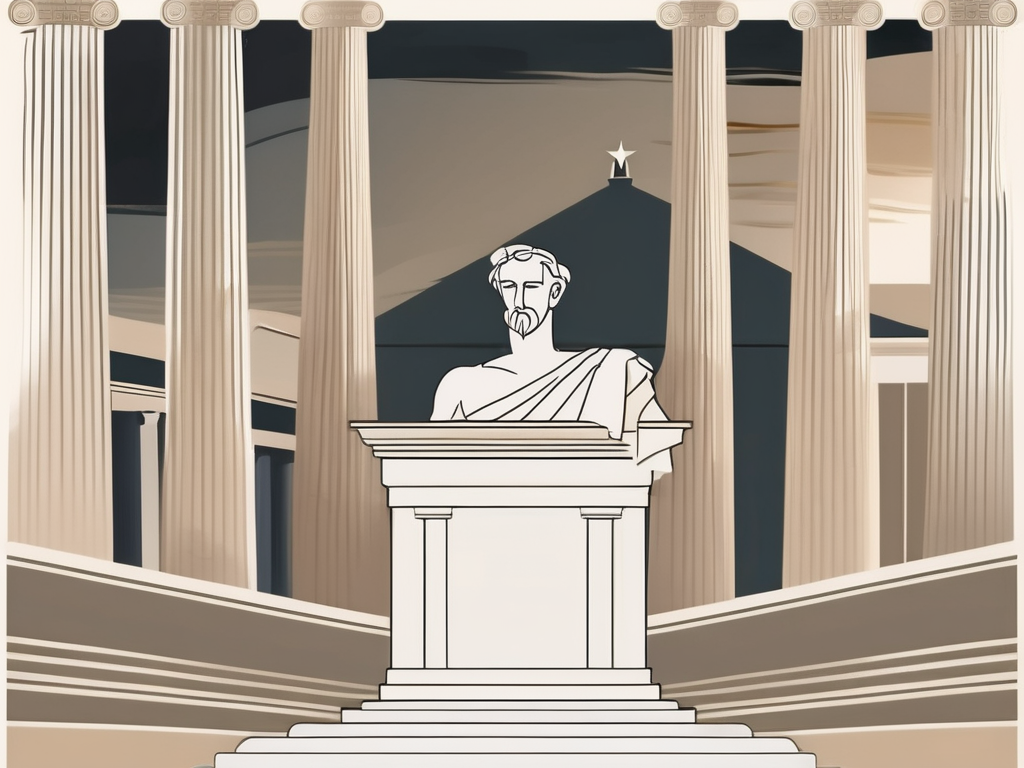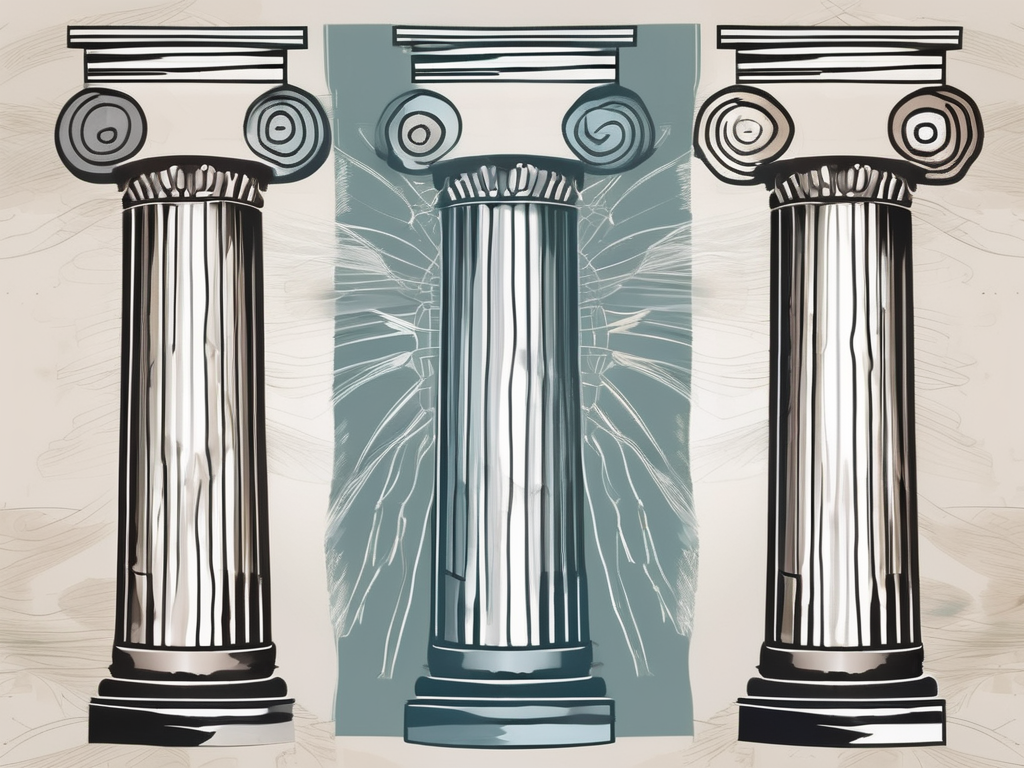Anaxagoras was a philosopher who lived in ancient Greece and had a profound impact on the development of philosophical thought. His ideas and beliefs challenged the existing worldview and laid the foundation for many future philosophical concepts. In this article, we will explore the life, teachings, and legacy of this influential figure.
Early Life and Education of Anaxagoras
Born in Clazomenae, a city in Ionia, Anaxagoras came from a well-respected family. His parents instilled in him a thirst for knowledge, and from a young age, he showed great intellectual curiosity.
Anaxagoras’ philosophical journey truly began when he moved to Athens, the center of intellectual activity in ancient Greece, to pursue his education. It was in this vibrant city that he would develop his groundbreaking theories and establish himself as a prominent philosopher.
Birth and Family Background
Anaxagoras was born into a noble family in Clazomenae, which granted him access to a quality education that was not available to all. This upbringing shaped his perspectives and undoubtedly influenced his later philosophical pursuits.
Clazomenae, situated on the coast of Ionia, was a bustling city known for its maritime trade and cultural vibrancy. Anaxagoras grew up in an environment where ideas from different cultures and philosophies mingled, fostering an atmosphere of intellectual curiosity and open-mindedness.
His family, respected and influential in the city, provided Anaxagoras with ample resources to pursue his education. They recognized his potential and encouraged him to explore various fields of knowledge, nurturing his natural inclination towards intellectual pursuits.
Philosophical Education in Athens
Upon arriving in Athens, Anaxagoras became a pupil of the renowned philosopher Anaximenes. Under his guidance, Anaxagoras delved deep into the realm of philosophy and began formulating his ideas that would challenge the status quo.
Athens, known as the birthplace of democracy and a hub of intellectual activity, offered Anaxagoras a rich intellectual environment. The city was home to some of the greatest thinkers of the time, and Anaxagoras eagerly immersed himself in the vibrant philosophical debates and discussions that took place in the agora and the various academies.
Studying under Anaximenes provided Anaxagoras with a solid foundation in various branches of knowledge, including physics, astronomy, and biology. This interdisciplinary approach would later shape his own unique philosophical beliefs.
Anaxagoras’ time in Athens was not only marked by his academic pursuits but also by his interactions with other influential philosophers of the time. He engaged in spirited debates with the likes of Socrates, Plato, and Parmenides, exchanging ideas and refining his own philosophical framework.
It was during this period that Anaxagoras developed his groundbreaking theory of nous, or mind, as the driving force behind the universe. This concept challenged the prevailing views of the time and laid the foundation for future philosophical and scientific advancements.
Anaxagoras’ Philosophical Beliefs and Teachings
One of Anaxagoras’ central concepts was the notion of Nous, or Mind. He contended that Nous was the organizing force behind the universe, responsible for bringing order to the chaotic cosmos. This idea challenged the prevailing belief that the cosmos was governed by random chance.
Anaxagoras believed that Nous was the fundamental substance that permeated all things, giving them their unique qualities. He argued that everything in the universe, from the smallest particle to the largest celestial body, contained a portion of Nous.
According to Anaxagoras, the universe was not a result of chaos or chance but rather the product of a conscious and intelligent Mind. This revolutionary concept laid the groundwork for later philosophical and scientific theories.
Anaxagoras’ theory of Nous went beyond the mere existence of an organizing force. He delved into the understanding of how Nous interacted with the physical world. He proposed that Nous acted as a guiding principle, directing the movement and transformation of matter. It was through the influence of Nous that the universe maintained its order and harmony.
Understanding Nous (Mind) Concept
Anaxagoras’ concept of Nous was not limited to its role in the universe. He believed that Nous also played a crucial role in human cognition and understanding. According to Anaxagoras, the human mind was a reflection of the universal Mind, allowing individuals to grasp and comprehend the world around them.
For Anaxagoras, the human mind was not a passive recipient of knowledge but an active participant in the process of understanding. He argued that through the power of Nous, humans could discern the underlying principles and causes behind natural phenomena. This emphasis on rational thought and intellectual inquiry laid the foundation for the development of philosophy as a discipline.
Anaxagoras’ theory of Nous had far-reaching implications for the understanding of human consciousness and the nature of reality. It challenged the prevailing belief that the mind was separate from the physical world, asserting instead that they were interconnected and intertwined.
Anaxagoras’ Theory of Everything
Another notable aspect of Anaxagoras’ philosophy was his theory of everything. He proposed that all matter consisted of an infinite number of smaller constituents, known as “seeds.” These seeds, he claimed, were responsible for the properties and characteristics of all substances.
Anaxagoras believed that these seeds were in constant motion and that the combinations and separations of these particles gave rise to the creation and transformation of matter. This groundbreaking theory challenged the prevailing belief that matter was indivisible and unchangeable.
Furthermore, Anaxagoras’ theory of everything extended beyond the physical realm. He argued that the seeds of Nous were not limited to material substances but also existed in the realm of ideas and concepts. Just as the physical world was governed by the motion and interaction of seeds, so too were thoughts and ideas shaped by the interplay of Nous.
This holistic view of reality, encompassing both the physical and intellectual realms, was a departure from the reductionist approach of his contemporaries. Anaxagoras’ theory of everything provided a comprehensive framework for understanding the interconnectedness of the universe and the human experience within it.
Anaxagoras and the Athenian Society
Anaxagoras was not only a philosopher but also an active member of Athenian society. His ideas and teachings had a significant impact on the intellectual climate of the time and influenced the thinking of many Athenians.
Anaxagoras’ Influence on Athenian Thought
Anaxagoras’ philosophical ideas, such as Nous and his theory of seeds, resonated with many Athenians who sought a deeper understanding of the world around them. His teachings attracted a devoted following and ignited intellectual debates among the citizens of Athens.
As his influence grew, Anaxagoras became known as a profound thinker and a source of inspiration for aspiring philosophers in Athens. His ideas extended far beyond the realm of philosophy, shaping the scientific and cultural landscape of the city.
Legal Challenges and Exile
Unfortunately, Anaxagoras’ progressive ideas and controversial teachings also attracted opposition from conservative factions within Athenian society. He faced legal challenges and accusations of impiety, as his philosophical theories called into question the traditional religious beliefs of the time.
Ultimately, Anaxagoras was forced to flee Athens and seek refuge in Lampsacus. Despite the setback, his teachings continued to spread, leaving an indelible mark on the philosophical development of the ancient world.
Anaxagoras’ Legacy in Philosophy
Anaxagoras’ contributions to philosophy were profound and enduring. His ideas laid the groundwork for future philosophers, shaping the course of philosophical thought for centuries to come.
Impact on Later Philosophers
Anaxagoras’ notions of Nous and the seeds of matter influenced subsequent schools of thought, including the teachings of Plato and Aristotle. His ideas provided a starting point for deeper investigations into metaphysics, epistemology, and cosmology.
Both Plato and Aristotle acknowledged Anaxagoras’ contributions and incorporated his concepts into their own philosophical systems, demonstrating the enduring impact of his ideas.
Modern Interpretations of Anaxagoras’ Work
Anaxagoras’ philosophy continues to captivate modern scholars and philosophers. His ideas have been reevaluated in light of contemporary scientific discoveries, with some finding resonance and relevance in his concepts.
While Anaxagoras’ scientific explanations may not align with current understanding, his emphasis on the role of the mind and the dynamic nature of matter serves as a reminder of the ongoing quest for knowledge and the limitless possibilities of human understanding.
The Death of Anaxagoras
In his final years, Anaxagoras lived a relatively quiet life in Lampsacus. He continued to refine his philosophical ideas and impart his wisdom to a new generation of students.
Final Years and Death
As he grew older, Anaxagoras reflected on the impact his teachings had on the world and the mark he would leave behind. He continued to be revered by his students and esteemed for his intellectual prowess.
Anaxagoras passed away peacefully in his sleep, leaving behind a rich and enduring legacy that would shape the direction of philosophy for centuries to come.
Posthumous Recognition and Honors
Although Anaxagoras faced challenges and exile during his lifetime, his contributions were not forgotten. His philosophical theories continued to be studied and discussed long after his death, earning him posthumous recognition and honors.
The enduring respect for Anaxagoras’ ideas serves as a testament to his enduring influence on ancient Greek philosophy and the broader intellectual history of humanity.
In conclusion, Anaxagoras, the influential Greek philosopher, revolutionized the way ancient Greeks thought about the universe and existence. His concepts of Nous, the organizing Mind, and the theory of seeds brought a new perspective to the study of philosophy and science. Despite facing legal challenges and exile, his ideas left an indelible mark on Athenian society and influenced the thinking of future philosophers. Anaxagoras’ intellectual legacy can still be seen in the modern interpretations of his work, showcasing the timeless relevance of his groundbreaking ideas.












